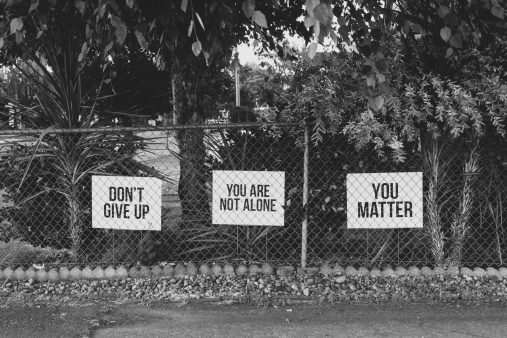Is being resilient an unfair burden?
11 July 2022
Navigating the world of public debate can be a difficult task. There are many hurdles to overcome in the process of finding out about and sharing one’s views on social and political issues. There is the long and difficult task of sorting through the mass of available information in search of reliable and useful information; the difficulty of communicating with those with whom one shares little common ground; the weighing up of different considerations and viewpoints to come to a reasoned position on complex issues; and the challenge of getting oneself heard, and taken seriously, among the cacophony of voices – to name just a few.
One of the roles of education is to prepare and equip students to navigate public discourse. As engaged and responsible citizens, students will need to be able to make informed choices, have an awareness of issues that affect them and others, and be able to communicate their own views, perspectives and needs. Perhaps, through the efforts of educators (among other things) the state of public discourse will improve and some of the challenges will lessen. Perhaps educational initiatives can lead to a decrease in polarisation and more constructive conversations across political divides. But even if this can be achieved, it will not happen overnight. So, it is important to prepare students for the difficult, messy and challenging world of public discourse.
Part of the solution is to teach valuable skills – such as the skill of recognising reliable sources, or the skills involved in effective communication. Alongside these skills are what some philosophers and educational theorists refer to as intellectual virtues. Intellectual virtues are the character traits, dispositions, attitudes and ways of thinking which are possessed by a good knower. That is, someone who is effective, skilled and well-motivated in their engagement in the pursuit and sharing of knowledge. Typical examples include intellectual courage, intellectual honesty and open-mindedness. An open-minded person, for instance, recognises the value of knowledge and is motivated by this to give due consideration to a range of different viewpoints, perspectives and sources of information. As a result, she typically gains greater knowledge (and avoids more false beliefs) than a closed-minded person.
Some intellectual virtues can help students to overcome the challenges of navigating public discourse. For example, to possess the virtue of intellectual perseverance is to not be demotivated by setbacks or lack of progress in the pursuit of knowledge because one recognises the value of the end goal – gaining and sharing valuable knowledge and understanding. This, clearly, will be an advantage when engaging with public discourse. Even when they only seem to find misinformation and propaganda, the intellectually perseverant person will be motivated to keep searching for reliable sources. When attempts to find common ground with others fail, they will not give up but will try again. And when they struggle to get themselves heard and taken seriously, they won’t be demotivated, but instead will search for new platforms or try out new strategies.
But it’s important to note that being intellectually perseverant and intellectually courageous can be costly – it takes effort, time and energy and the backlash that people face may have lasting effects. Many of those who use social media to raise awareness of important issues face a great deal of abuse. Food writer and campaigner Jack Monroe described how their work to raise awareness of food poverty, women’s and trans rights came at ‘great personal and emotional cost’ as a result of ‘endless and exhausting’ abuse online’.[1] In 2018, Monroe decided to take a break from twitter for the sake of protecting their mental health. Monroe’s intellectual perseverance and courage in continuing to speak out despite this abuse may have led to their message having greater impact and reaching a greater number of people, but in doing so, they were exposed to more and more abuse.
By their very nature, intellectual perseverance and intellectual courage will involve exposure to set-backs, frustration, adversity and even harm. But it is important to note that the most significant costs may not be evenly distributed: women, ethnic and racial minorities, disabled people, LGBTQIA+ people and members of many other minority or marginalised groups typically face more abuse and resistance when they participate in public discourse. In just one example, a study conducted by Amnesty International in 2017 into online abuse of women MPs found that the twenty BAME (Black and Minority Ethnic) MPs in the study received almost half of the abusive tweets posted, despite there being eight times as many white MPs in the study.[2]
When students develop intellectual virtues like intellectual perseverance, they become, we might think, more resilient. Resilience has been defined in several ways but can be broadly understood as the ability to bounce back and cope adaptively after encountering difficulty, setbacks, frustration, challenges or adversity and return to a relatively normal level of well-being.[3]
But there are two important points to make about the limitations of teaching intellectual virtues to help students to cope with the difficulties of navigating public discourse. Firstly, resilience doesn’t depend solely on individual character. Much research on resilience in children has found that ‘nurturing environments’, including caring relationships, safety, structure and guidance, are significant contributors to students’ resilience. Whether or not someone can overcome difficulty or tolerate hardship will also depend on their material or social circumstances. It might be easier to overcome the difficulties caused by copious misinformation about the Covid-19 vaccine if you have plenty of time to wade through articles and do background research in order to find reliable information. Being able to overcome this hurdle may be much more difficult if you have limited time and many other responsibilities.
One character profile that is often praised as exemplifying resilience is that of the gritty individual. The gritty individual is one who is able to push through setbacks and difficulties and sustain their commitment to achieving goals despite discomfort or hardship. Whilst grit has long been recognised as a very valuable trait, and a lack of grit can hold people back from achieving success, too much focus on developing grit, especially in education, can compound structural disadvantage. Diversity, Equality and Inclusion consultant Ariana González Stokas warns that too much emphasis within education on grit as a key component for success can convey to students that their lack of grittiness is to blame when they are unable to succeed despite gaps in vital support. [4] By treating lack of support and structural disadvantage as something simply to be overcome, rather than issues which must be addressed at their root, this might further entrench disparities in educational outcomes.
In her highly influential work on the power of grit, Angela Duckworth suggested that it is disadvantaged and underprivileged students who will most benefit from education that focuses on the development of grit.[5] But critics point out that historically grit has been something for which those who are more privileged have been in need.[6] Underprivileged students are much more likely to have already developed a fair amount of grit when overcoming difficulties and adversity in their lives.
Teaching intellectual virtues such as intellectual courage and intellectual perseverance can be helpful for equipping students to deal with some of the challenges of public discourse. But we must be wary of placing too much emphasis on individual character-based solutions. Sometimes individual character is not enough, and even when it is it can carry disproportionately high costs for those who are particularly vulnerable.
[1] Quoted in The Guardian (2015) ‘Jack Monroe quits Twitter over homophobic abuse’.
[2] https://www.amnesty.org.uk/online-violence-women-mps
[3] Toni Noble and Helen McGrath (2012) Well-being and resilience in education. In: S. David, I. Boniwell and A. C. Ayers (eds) The Oxford Handbook of Happiness. Oxford: Oxford University Press.
[4] Ariana González Stokas (2015) A Genealogy of Grit: Education in the New Gilded Age. Educational Theory 65(5), pp.513-528.
[5] Angela Duckworth (2016) Grit: The Power of Passion and Perseverance. New York: Scribner Book Company.
[6] James Arthur, Kristjan Kristjánsson & Steve Thoma (2016) Is grit the magic elixir of good character? The Jubilee Centre for Character and Virtues Insight Series.
Picture Dan Meyers on Unsplash
- July 2024
- June 2024
- May 2024
- April 2024
- March 2024
- February 2024
- January 2024
- December 2023
- November 2023
- October 2023
- September 2023
- August 2023
- July 2023
- June 2023
- May 2023
- April 2023
- March 2023
- February 2023
- January 2023
- December 2022
- November 2022
- October 2022
- September 2022
- August 2022
- July 2022
- June 2022
- May 2022
- April 2022
- March 2022
- February 2022
- January 2022
- December 2021
- November 2021
- October 2021
- September 2021
- August 2021
- July 2021
- June 2021
- May 2021
- April 2021
- March 2021
- February 2021
- January 2021
- December 2020
- November 2020
- October 2020
- September 2020
- August 2020
- July 2020
- June 2020
- May 2020
- April 2020
- March 2020
- February 2020
- January 2020
- December 2019
- November 2019
- October 2019
- September 2019
- August 2019
- July 2019
- June 2019
- May 2019
- April 2019
- March 2019
- February 2019
- January 2019
- December 2018
- November 2018
- October 2018
- September 2018
- August 2018
- July 2018
- June 2018
- May 2018
- April 2018
- March 2018
- February 2018
- January 2018
- December 2017
- November 2017
- October 2017
- September 2017
- August 2017
- July 2017
- June 2017
- May 2017

